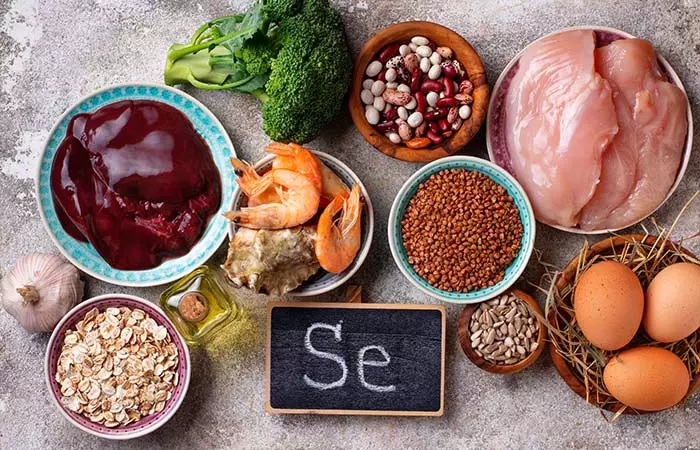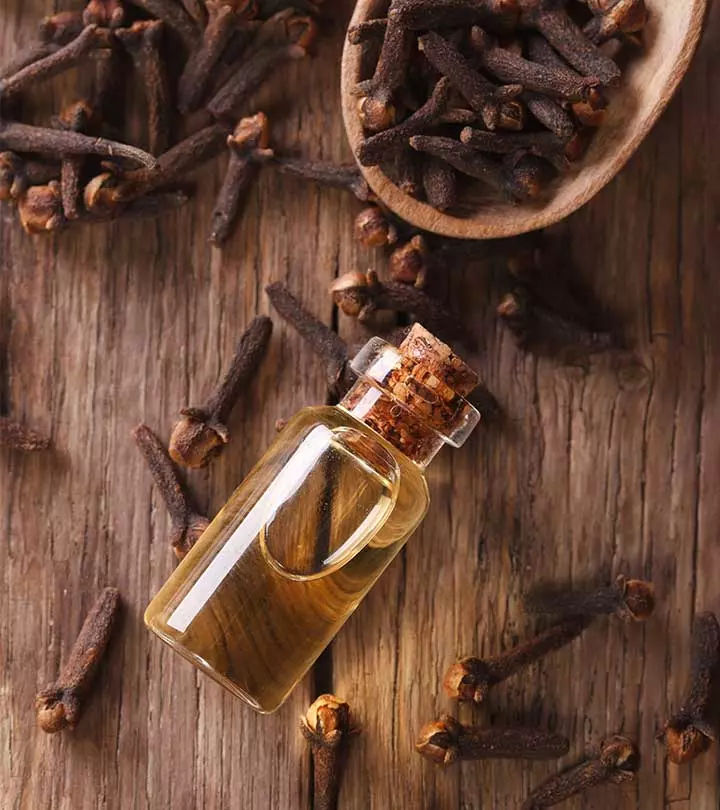Health Benefits Of Selenium: 6 Key Reasons To Boost Wellbeing
Boost your well-being with essential minerals and discover nutrient-rich foods today!

Image: Shutterstock
Selenium is an important trace mineral that contributes to several bodily functions. But since it is a trace mineral, not many of us know a lot about it. Studies have discovered the benefits of selenium in fighting oxidative stress and preventing a host of diseases (1).
However, selenium’s role extends beyond scavenging free radicals. This post will tell you why adequate selenium intake is important.
In This Article
What Are The Health Benefits Of Selenium?
Selenium has powerful antioxidant properties that may aid the treatment of cancer and heart disease. Adequate selenium intake is also linked to improved cognitive health and immunity.
1. May Help Prevent Cancer
Studies show that selenium may negatively affect cancer progression (2). This effect can be attributed to specific compounds, called selenoproteins, associated with selenium.
Selenium displays anti-cancer activity against cancers of the breast, lung, prostate, colon, and the skin (2). It also helps prevent cancer metastasis (development of secondary tumor growths away from the original cancer site).
Selenium was found to have the strongest effects on the prevention of prostate cancer. Among men who took selenium, 63% fewer deaths due to prostate cancer were reported (3).
However, certain studies ended with mixed findings as well. This was especially true with the unsupervised use of selenium supplements, which were found to increase the risk of prostate cancer (4).
2. May Promote Cardiovascular Health
In observational studies, selenium was linked to a decreased risk of coronary heart disease (5). This can be attributed to the mineral’s potent antioxidant activity.
The selenoproteins play a role here too. They prevent LDL oxidation, vascular inflammation, and atherogenesis (6). They also help relieve cardiac stress by fighting the reactive oxygen species in the heart.
Selenium supplementation may also have a beneficial effect on heart health. The mineral decreases the concentrations of C-reactive proteins (body proteins whose concentration increases in response to inflammation), thereby possibly fighting inflammation and associated cardiovascular disease (7).
However, certain studies are still inconclusive regarding the benefits of selenium for heart health (8). Another study does not recommend the use of selenium supplements to prevent cardiovascular disease (5).
3. May Help Prevent Cognitive Decline
The selenoproteins help fight oxidative stress, which may help prevent age-related cognitive decline (9). In case of selenium deficiency, the brain is the only organ containing the mineral for the longest time. This shows us the role selenium plays in brain health.
In a study conducted on elderly rural Chinese, low levels of selenium were linked to lower cognitive function (10). Higher selenium levels were also associated with better cognition.
Selenium also plays a role in the synthesis of glutathione peroxidases, which are important antioxidant enzymes present in brain tissues. These enzymes reduce the concentration of reactive oxygen species in the brain (11).
4. May Improve Thyroid Functioning
The thyroid gland contains the highest amount of selenium per gram of tissue. Some research suggests that selenium intake can boost thyroid functioning, especially in individuals dealing with hypothyroidism (12).
Optimal intake of selenium may even prevent thyroid disease (13). Another study also sheds light on the possibility of selenium deficiency causing destruction of the thyroid gland (14).
The proteins associated with selenium play a role in regulating the action of thyroid hormones (15).
5. Boosts Immunity
Dietary selenium was found to boost immune function through its selenoproteins (16). Selenium can not only boost immunity, but it also regulates excessive immune responses and chronic inflammation.
Selenium improves one’s resistance to viral infections by promoting immunity (17). The mineral also influences all the components of the immune system. It is abundant in immune tissues, such as the spleen, lymph nodes, and the liver.
Adequate selenium also boosts the functioning of T cells, which are important components of the human immune system (18).
Selenium may aid asthma treatment. Though the direct use of selenium to treat asthma is yet to be studied, sources suggest that it may complement asthma treatments (19).
6. May Promote Fertility
Selenium has a role to play in human reproduction. In studies, low selenium levels were linked to male infertility (20).
In yet another small study, selenium was found to possibly prevent infertility by fighting free radical damage (21).
These benefits show us how important selenium is. Though a trace mineral, it has a very important role to play in human health.
The best way to get adequate amounts of selenium is to eat foods rich in the mineral.
Selenium is abundant in certain every day foods. The following table will give you an idea:
| Food | Serving | mcg/Serving | DV% |
| Brazil Nuts | 6 to 8 nuts | 544 | 777 |
| Cooked yellowfin tuna | 3 ounces | 92 | 131 |
| Cooked halibut | 3 ounces | 47 | 67 |
| Sardines, canned in oil | 3 ounces | 45 | 64 |
| Roasted ham | 3 ounces | 42 | 60 |
| Canned shrimp | 3 ounces | 40 | 57 |
| Cooked macaroni | 1 cup | 37 | 53 |
| Roasted beef steak | 3 ounces | 33 | 47 |
| Cooked brown rice | 1 cup | 19 | 27 |
| Hard boiled egg | 1 large | 15 | 21 |
*values sourced from National Institutes of Health, Selenium
Ensure you include these foods in your regular diet. Failure to do so can lead to selenium deficiency.
What Are The Symptoms Of Selenium Deficiency?
Symptoms of selenium deficiency are majorly related to the heart and joints. Moderate deficiency can lead to infertility in men and neurological diseases (22).
Fatigue, muscle weakness, mental fog, hair loss, and a weakened immune system are the other symptoms.
The recommended daily intake of selenium is 55 mcg/day for adults. The tolerable intake of this mineral is 400 mcg/day. Anything beyond this can lead to selenium toxicity (23).
A Note On Selenium Toxicity
Excess intake of selenium can also lead to problems. Taking more than 400 mcg of selenium a day, every day, can cause the following symptoms over time (24):
- Nausea
- Brittle nails
- Skin rashes
- A metallic taste in the mouth
- Diarrhea
- Garlic breath
While everyone knows about the importance of vitamins and minerals like copper, zinc, iron, etc, in our overall health and metabolic processes, it is the significance of trace minerals like selenium that often gets overlooked. With powerful antioxidant properties, selenium not only helps boost your cardiovascular health but might help reduce the risk of cancer too. Selenium benefits your cognitive and mental health as well. You can include selenium-rich foods like Brazil nuts, sardines, and hard-boiled eggs amidst the many options listed above to get an adequate amount of this trace mineral. However, you must be careful not to overconsume it to avoid the potential risks of toxicity and side effects.
Frequently Asked Questions
Do you need selenium supplements?
It depends on your condition. Most often, you can treat selenium deficiency by consuming adequate foods rich in the mineral. But if you have any specific condition, your doctor may recommend supplements. Please take selenium supplements under the supervision of a health care provider as they may interact with certain other medications (24).
Can you take selenium and zinc together?
Studies do not recommend taking selenium and zinc supplements together. The minerals might interact with each other and reduce bioavailability (25).
Is selenium good for skin and hair?
Some research suggests that selenium may promote skin and hair health (26). More research is warranted, though.
How long does selenium stay in the body?
Most of the selenium entering the body leaves within 24 hours (27).
References
Articles on StyleCraze are backed by verified information from peer-reviewed and academic research papers, reputed organizations, research institutions, and medical associations to ensure accuracy and relevance. Read our editorial policy to learn more.
- Selenium: its role as antioxidant in human health, Environmental Health and Preventive Medicine, US National Library of Medicine, National Institutes of Health.
https://www.ncbi.nlm.nih.gov/pmc/articles/PMC2698273/ - Is Selenium a Potential Treatment for Cancer Metastasis? Nutrients, US National Library of Medicine, National Institutes of Health.
https://www.ncbi.nlm.nih.gov/pmc/articles/PMC3705340/ - Selenium and prostate cancer, Harvard Medical School.
https://www.health.harvard.edu/newsletter_article/selenium-and-prostate-cancer - Selenium for preventing cancer, The Cochrane Database of Systematic Reviews, US National Library of Medicine, National Institutes of Health.
https://pubmed.ncbi.nlm.nih.gov/29376219/ - Selenium and coronary heart disease: a meta-analysis, The American Journal of Clinical Nutrition, US National Library of Medicine, National Institutes of Health.
https://www.ncbi.nlm.nih.gov/pmc/articles/PMC1829306/ - Selenium and Its Supplementation in Cardiovascular Disease—What do We Know? Nutrients, US National Library of Medicine, National Institutes of Health.
https://www.ncbi.nlm.nih.gov/pmc/articles/PMC4446741/ - The effect of selenium supplementation on coronary heart disease: A systematic review and meta-analysis of randomized controlled trials. Journal of Trace Elements in Medicine and Biology, US National Library of Medicine, National Institutes of Health.
https://pubmed.ncbi.nlm.nih.gov/28965605/ - Selenium levels and hypertension: a systematic review of the literature, Oregon State University.
https://pubmed.ncbi.nlm.nih.gov/23590757/ - Selenium and cognitive impairment: a brief-review based on results from the EVA study, BioFactors, US National Library of Medicine, National Institutes of Health.
https://pubmed.ncbi.nlm.nih.gov/22419540/ - Selenium Level and Cognitive Function in Rural Elderly Chinese, American Journal of Epidemiology, US National Library of Medicine, National Institutes of Health.
https://www.ncbi.nlm.nih.gov/pmc/articles/PMC2760949/ - Cognitive Function In Depth, Oregon State University.
https://lpi.oregonstate.edu/mic/health-disease/cognitive-function#selenium-deficiency - Selenium and Thyroid Disease: From Pathophysiology to Treatment, International Journal of Endocrinology, US National Library of Medicine, National Institutes of Health.
https://www.ncbi.nlm.nih.gov/pmc/articles/PMC5307254/ - Selenium and the Thyroid: A Close-Knit Connection, The Journal of Clinical Endocrinology & Metabolism, Oxford Academic Journals.
https://academic.oup.com/jcem/article/95/12/5180/2835162 - Selenium and thyroid function in infants, children and adolescents, BioFactors, US National Library of Medicine, National Institutes of Health.
https://pubmed.ncbi.nlm.nih.gov/14757964/ - Selenium, Centers for Disease Control and Prevention.
https://www.cdc.gov/nutritionreport/99-02/pdf/nr_ch4b.pdf - The Role of Selenium in Inflammation and Immunity: From Molecular Mechanisms to Therapeutic Opportunities, Antioxidants & Redox Signaling, US National Library of Medicine, National Institutes of Health.
https://www.ncbi.nlm.nih.gov/pmc/articles/PMC3277928/ - Selenium, immune function and resistance to viral infections, Journal of the Dietitians Association of Australia, Wiley Online Library.
https://onlinelibrary.wiley.com/doi/full/10.1111/j.1747-0080.2008.00260.x - The Role of Selenium in Human Immunity, Medical Journal of Zambia.
http://citeseerx.ist.psu.edu/viewdoc/download?doi=10.1.1.1017.6974&rep=rep1&type=pdf - Selenium and asthma, Molecular Aspects of Medicine, US National Library of Medicine, National Institutes of Health.
https://www.ncbi.nlm.nih.gov/pmc/articles/PMC3246085/ - Semen selenium and human fertility, Fertility and Sterility, US National Library of Medicine, National Institutes of Health.
https://pubmed.ncbi.nlm.nih.gov/6500080/ - Selenium in human male reproductive organs, European Society for Human Reproduction and Embryology.
http://citeseerx.ist.psu.edu/viewdoc/download?doi=10.1.1.573.6597&rep=rep1&type=pdf - Selenium deficiency, National Center for Biotechnology Information, National Institutes of Health.
https://www.ncbi.nlm.nih.gov/books/NBK482260/ - Selenium, National Institutes of Health.
https://ods.od.nih.gov/factsheets/Selenium-HealthProfessional/#h3 - Selenium, National Institutes of Health.
https://ods.od.nih.gov/factsheets/Selenium-Consumer/ - The Effect of Zinc and Selenium Supplementation Mode on Their Bioavailability in the Rat Prostate. Should Administration Be Joint or Separate? Nutrients, US National Library of Medicine, National Institutes of Health.
https://www.ncbi.nlm.nih.gov/pmc/articles/PMC5083989/ - Selenoproteins are essential for proper keratinocyte function and skin development, PloS One, US National Library of Medicine, National Institutes of Health.
https://pubmed.ncbi.nlm.nih.gov/20805887/ - Toxic Substances Portal – Selenium, Agency for Toxic Substances & Disease Registry.
https://wwwn.cdc.gov/TSP/unavailable.aspx
Read full bio of Madhu Sharma
Read full bio of Ravi Teja Tadimalla
































Community Experiences
Join the conversation and become a part of our empowering community! Share your stories, experiences, and insights to connect with other beauty, lifestyle, and health enthusiasts.